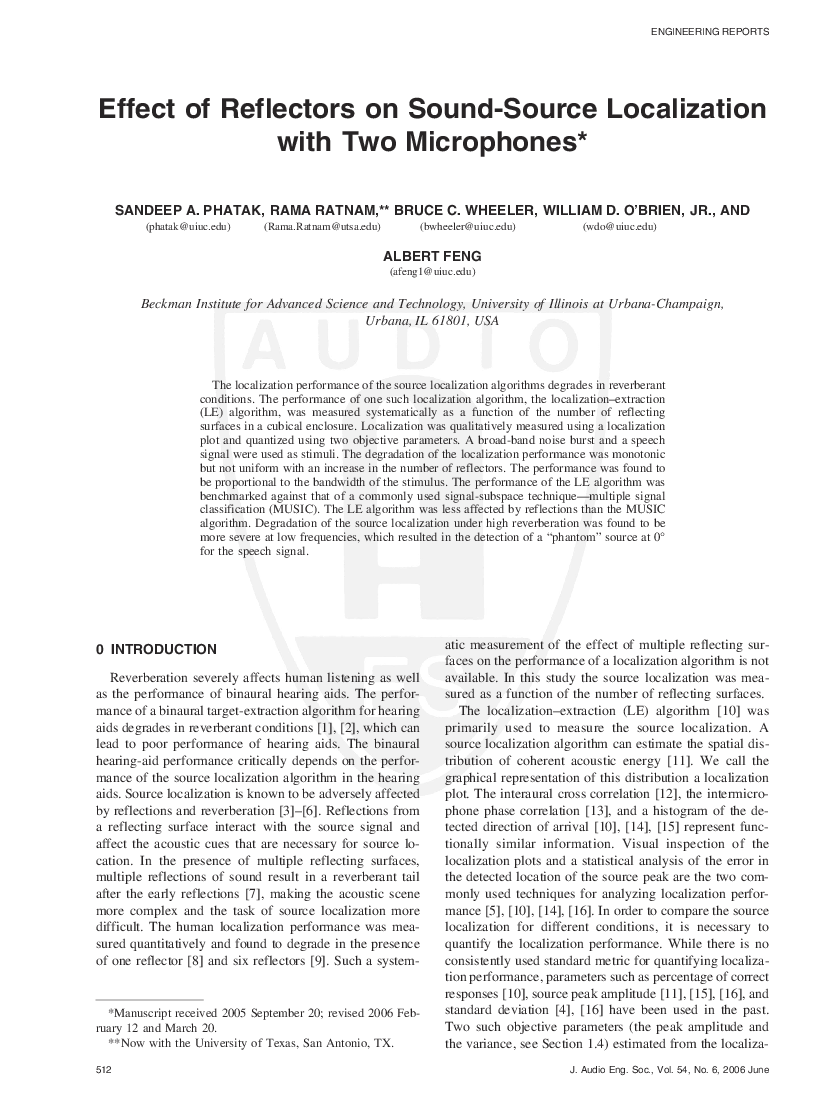Home / Publications / E-library page
You are currently logged in as an
Institutional Subscriber.
If you would like to logout,
please click on the button below.
Home / Publications / E-library page
Only AES members and Institutional Journal Subscribers can download
[Engineering Report] The localization performance of the source localization algorithms degrades in reverberant conditions. The performance of one such localization algorithm, the localization–extraction (LE) algorithm, was measured systematically as a function of the number of reflecting surfaces in a cubical enclosure. Localization was qualitatively measured using a localization plot and quantized using two objective parameters. A broad-band noise burst and a speech signal were used as stimuli. The degradation of the localization performance was monotonic but not uniform with an increase in the number of reflectors. The performance was found to be proportional to the bandwidth of the stimulus. The performance of the LE algorithm was benchmarked against that of a commonly used signal-subspace technique—multiple signal classification (MUSIC). The LE algorithm was less affected by reflections than the MUSIC algorithm. Degradation of the source localization under high reverberation was found to be more severe at low frequencies, which resulted in the detection of a “phantom” source at 0° for the speech signal.
Author (s): Phatak, Sandeep A.; Ratnam, Rama; Wheeler, Bruce C.; O’brien, Jr., William D.; Feng, Albert
Affiliation:
University of Illinois at Urbana-Champaign, Urbana, IL, USA
(See document for exact affiliation information.)
Publication Date:
2006-06-06
Import into BibTeX
Permalink: https://aes2.org/publications/elibrary-page/?id=13689
(659KB)
Click to purchase paper as a non-member or login as an AES member. If your company or school subscribes to the E-Library then switch to the institutional version. If you are not an AES member Join the AES. If you need to check your member status, login to the Member Portal.

Phatak, Sandeep A.; Ratnam, Rama; Wheeler, Bruce C.; O’brien, Jr., William D.; Feng, Albert; 2006; Effect of Reflectors on Sound-Source Localization with Two Microphones [PDF]; University of Illinois at Urbana-Champaign, Urbana, IL, USA; Paper ; Available from: https://aes2.org/publications/elibrary-page/?id=13689
Phatak, Sandeep A.; Ratnam, Rama; Wheeler, Bruce C.; O’brien, Jr., William D.; Feng, Albert; Effect of Reflectors on Sound-Source Localization with Two Microphones [PDF]; University of Illinois at Urbana-Champaign, Urbana, IL, USA; Paper ; 2006 Available: https://aes2.org/publications/elibrary-page/?id=13689
@article{phatak2006effect,
author={phatak sandeep a. and ratnam rama and wheeler bruce c. and o’brien jr. william d. and feng albert},
journal={journal of the audio engineering society},
title={effect of reflectors on sound-source localization with two microphones},
year={2006},
volume={54},
issue={6},
pages={512-524},
month={june},}
TY – paper
TI – Effect of Reflectors on Sound-Source Localization with Two Microphones
SP – 512 EP – 524
AU – Phatak, Sandeep A.
AU – Ratnam, Rama
AU – Wheeler, Bruce C.
AU – O’brien, Jr., William D.
AU – Feng, Albert
PY – 2006
JO – Journal of the Audio Engineering Society
VO – 54
IS – 6
Y1 – June 2006